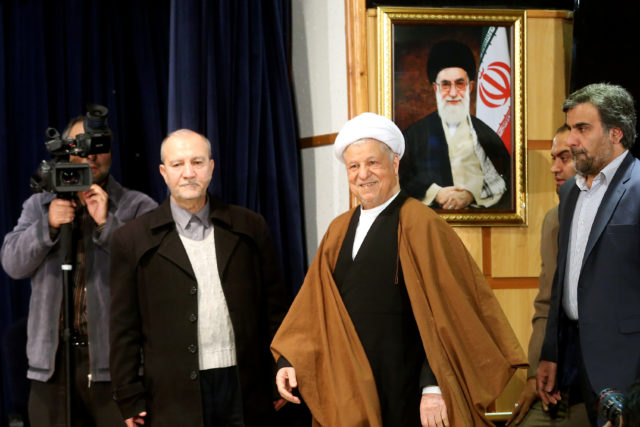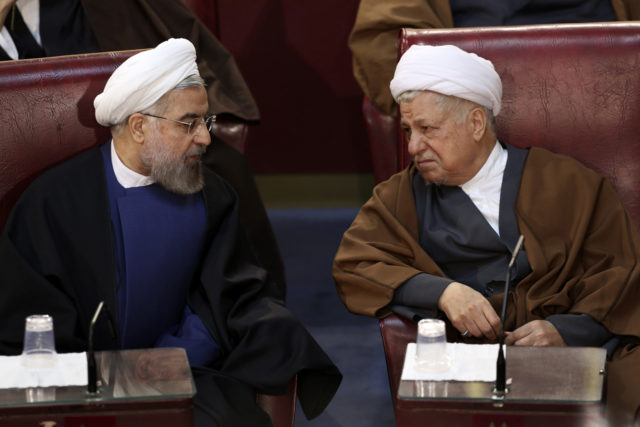By Barbara Slavin
Next to the founder of the Islamic Republic, Ayatollah Ruhollah Khomeini, few Iranians have had more influence over the past three decades of Iranian history than Ali Akbar Hashemi Rafsanjani.
Rafsanjani, who died Sunday at age 82 of a heart attack, was a master manipulator of Iranian politics who inspired both respect and extreme animosity over the course of a tumultuous political career. As president from 1989-1997, he was implicated in extra-judicial murders both in Iran and abroad and dogged by reports of corruption. But he also sought a better relationship with the United States and repaired Iran’s relations with Saudi Arabia. His death comes at a sensitive moment as a new president takes office in Washington and Iran seeks to expand its regional influence and boost a sanctions-weakened economy.

In this December 2015 photo, former Iranian President Akbar Hashemi Rafsanjani, center, who is also a member of the Experts Assembly, arrives for a press briefing after registering his candidacy for the Feb. 26 elections of the assembly at interior ministry in Tehran, Iran. Rafsanjani died of a heart attack January 8 in Tehran. He was 82. (AP
Falling afoul of Khomeini’s successor, Ayatollah Ali Khamenei, after fraud-tainted elections in 2009, Rafsanjani gained a new following among the Iranian population. Barred from running again for president in 2013, he garnered more votes than any other candidate in elections last year for the Assembly of Experts, a body tasked with approving a successor to Khamenei. Rafsanjani’s allies will now unite more than ever behind President Hassan Rouhani, a Rafsanjani protégé who favors Iran’s re-integration into the international economy and gradual domestic reforms.
A cleric whose family made its initial fortune from pistachio farming in south-central Iran, Rafsanjani was for many years Iran’s second most powerful official. When Khomeini died, Rafsanjani engineered a change in Iran’s constitution that eliminated the post of prime minister and elevated the powers of the presidency, a job Rafsanjani secured for himself in elections in 1989 and 1993. Rafsanjani backed Khamenei, then a lesser figure in the Islamic Republic, as Khomeini’s successor, on the assumption that Khamenei would be a malleable figure. Over the next quarter century, however, Khamenei accumulated more power than his one-time backer.
Still Rafsanjani remained influential. As president after the disastrous Iran-Iraq war, he assembled a team of ministers and other officials chosen more for their expertise than their ideological purity. He founded a party, the Executives of Construction, whose backing was crucial in sealing the victory of Mohammad Khatami, a reformist intellectual, as president in 1997. In 2005, when Khatami’s two terms were over, Rafsanjani ran again but lost to a populist firebrand, Mahmoud Ahmadinejad, in run-off elections.
Launching that campaign, Rafsanjani granted this journalist a rare interview in February 2005. He said, “We want good relations with the American people…(T)he mere fact that I am sitting here talking to you is an indication that we have no differences with the American people.”
Rafsanjani added that the then George W. Bush administration should unfreeze Iranian assets as a sign of goodwill before Iran could enter a formal dialogue with the U.S. government.
One of Rafsanjani’s sons, Mehdi Hashemi, told this reporter then that his father wanted to “solve the American problem. Because if he solves the American problem, he solves all Iranian problems.”
Unlike Khomeini and Khamenei, who has clung to an anti-U.S. position, Rafsanjani spent considerable time in the United States, traveling there in the 1970s while his brother, Mohammad, attended Berkley. He came away with a positive view of American society and regarded the United States as a sometimes well-meaning but often inept and dangerous actor on the world stage. The United States, he said in the 2005 interview, is like a dinosaur, with a tiny brain and a lumbering body. His son asked this reporter not to print that comment at the time, worried that it would have a negative impact on future Iran-U.S. relations.
Throughout his career, Rafsanjani was on top of the American file. He was a key figure in the so-called Iran Contra affair, helping arrange a clandestine deal with the Ronald Reagan administration in 1985 that brought Iran U.S. weapons and spare parts urgently needed for Iran’s military against Iraq. In return, Iran paid cash that the Reagan administration illegally funneled to anti-Communist rebels in Nicaragua.
Rafsanjani promised Reagan’s successor, George H.W. Bush, to help free remaining U.S. hostages in Lebanon but did not get the payoff Iran expected in part because of the Iranian regime’s apparent role in assassinating Iranian dissidents in Europe and in bombings against the Jewish community in Argentina.
Rafsanjani tried again with Bush’s successor, Bill Clinton, offering a lucrative deal to the Conoco oil company. Clinton, who had adopted a policy of “dual containment” of Iran and Iraq, responded with a ban on almost all U.S. trade with and investment in Iran.

In this March 2014 photo, Iranian President Hassan Rouhani, left, and former President Akbar Hashemi Rafsanjani, who are members of the Assembly of Experts, confer in a biannual meeting of the assembly in Tehran, Iran. Rafsanjani died January 8 of a heart attack in Tehran. He was 82.
Yet without Rafsanjani, there would likely have been no Khatami presidency and no subsequent thaw with the Clinton administration. Rafsanjani’s support for Rouhani certainly helped bolster Iran’s willingness to enter negotiations with the United States over its nuclear program and to accept a deal that required Iran to curb its nuclear activities.
With the master manipulator gone, Rouhani may have a harder time preserving the deal, especially in the face of likely hostility from the incoming administration of Donald Trump. Rafsanjani was also a champion of private enterprise, another Rouhani priority. And the former president might have played a role in mediating a resolution of Iran’s bitter rift with Saudi Arabia as he had once before during the 1990s.
Despite his repression of dissent in the 1980s and 90s, Rafsanjani identified himself with the Green Movement. In September 2009, he was barred from leading Friday prayers in Tehran because of his support for the demonstrators. One of his daughters, Faezeh, spent several months in prison for her role in the Green Movement; his son, Mehdi, began serving a 10-year sentence for corruption in 2015.
With their father gone, the fate of the Rafsanjani family is uncertain and the cause of pragmatism in Iran has lost a powerful champion. Supreme Leader Khamenei, a cancer survivor who many had thought would die before Rafsanjani – perhaps to be replaced by Rouhani with Rafsanjani’s support — was gracious in his initial comments, calling Rafsanjani a “companion of struggle” whose loss was “difficult and overwhelming.”
“The different opinions and interpretations at time in this long period could never entirely break up the friendship” between us, Khamenei said.
Barbara Slavin is Acting Director of the Future of Iran Initiative at the Atlantic Council in Washington. Follow her on Twitter @barbaraslavin1

